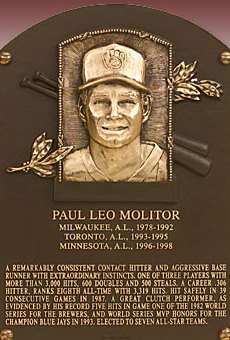|
 "See
my baby over there, everybody stop and stares "See
my baby over there, everybody stop and stares
He's got a little bit of this, a little bit of that
He's got a little bit of everything,
and a little bit of everything... is a lot"
-- Joanie Sommers
What does it take to be a truly great poker player, not just a winner, but great? Besides great talent in some aspects of the game
(which varies from player to player), it takes a little bit of everything. While this is true of all kinds of poker, it is
particularly true in Texas Hold'em ring games.
One of my favorite baseball players was Paul Molitor. He had a lot of some things, like intensity and determination, but he had a
little bit of everything in terms of talent. He wasn't ever the big power hitter on his team, but he hit a goodly number of home runs.
He was one of the best leadoff hitters of all time, but he batted third a large part of his career. He played all the infield
positions, but spent a large part of his career as a designated hitter. He wasn't the best at anything, but he was one of the best
players of his generation.
In Texas Hold'em, if you are great at some things, but poor at others (more like Dave Kingman was a baseball player), you likely will
be a loser. Spectacular but limited ability won't get you too far in Hold'em ring games. If opponents stay away from such a
player's key skill, that player is doomed. On the other hand, cobbling together good skills that can be applied to every situation
will make you a force to be reckoned with at the table at all times.
Having a little bit of everything brings in revenue from a
variety of sources, and probably more important...
it prevents massive leaks from occurring. No matter how sturdy it is in other ways, a single leak can sink a boat. Fortunately for all
of us as players, most players focus a lot more attention on what they do great rather than in plugging their leaks, or even more,
struggling to become better than average at their weaknesses.
One area that most average-but-not-great Hold'em players are terrible at is playing out of the blinds. They hate it. They think it is
hard. They "don't know where they are" with blind hands. They would rather play from their strength, attacking the blinds
themselves with a good hand. Boo-hoo. Sorry to rain on some parades, attacking the blinds with a good hand isn't very difficult. Most
anybody can do that. And it is a trap. You can't expect to win just by succeeding at your strengths. You need to have a little bit of
everything. If you were to manage to just break even at everything else, then you could win with your home runs. But if you are below
break even from everything else, your home runs might not be enough!
In order to win you have to do plenty of things that are hard or that you don't really like to do. Think of the times when your big
blind is raised by a player whose hand is a 2-to-1 equity favorite over yours. You are getting 3.5-to-1 on your call. It's easier to
fold here, but it is a losing play. Of course, calling and playing dreadfully when you face this situation is worse. But the road to
being a top player is to get a positive value out of this situation, to earn a better-than-folding value. Picking up value here is
like a star baseball player being able to lay down a sacrifice bunt, or move a runner over, or steal a base at least occasionally, or
have an ability to play several positions decently when need be.
Great players can do more things adequately than those that just come easily. Great players work on making their weaknesses less weak.
Great players work on improving their mediocre skills.
Texas Hold'em is a game of non-certainty. You seldom know for sure what the right action is. Most of the time you have to make a choice,
a mental calculation, about which action is the best one for you to take. Your particular skills work better against certain opponents than others,
and often times when facing a stranger you really have no idea what their skills are. Even players you are very familiar with can consciously
"play against type" and try to cross you up by doing the unexpected. To be a great player you quite simply have to be ready for everything.
What things in a game don't you like to do? What things aren't you very good at? If you want to be a great player, make it your goal
to be as good at these things as pitcher Bob Gibson
was as a hitter, or as Paul Molitor was at breaking up a double play. This is not what they were really paid for, not why they made
the team, but it was a big part of why the word "great" just rolls off your tongue when talking about them.
Also: Poker Experts,
Poker Skills,
Skill in Adapting and
Poker Anti-Skills |

